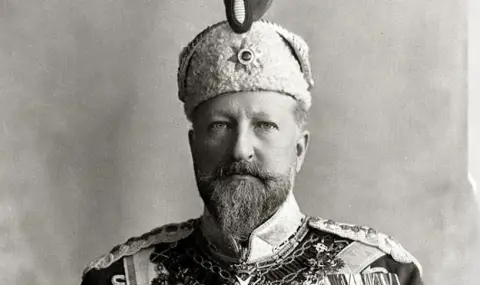On January 12, Bulgarian military intelligence officers celebrate their professional holiday. It was declared the Day of Bulgarian Military Intelligence by order of the Minister of War on February 11, 1997. First, Prince Ferdinand created the Intelligence Section of the Operational Department of the Army Headquarters with Decree No. 190 of December 31, 1907, which came into force on January 12, 1908.
It is the first specialized body for leading and managing military intelligence in Bulgaria. The first step in this direction was the Law on the Organization of the Armed Forces of the Principality of Bulgaria adopted by the National Assembly in 1891, recalls "Frognews". According to the Law, a special unit was formed at the Chancellery of the Ministry of War to process intelligence information received from Bulgarian diplomatic representatives abroad.
In 1947, the structures performing counterintelligence functions were removed from the composition of military intelligence, which became the basis of the newly created military counterintelligence. RO – SHV was reorganized into the Intelligence Department of the General Staff (RO – GSh), whose task was only to conduct foreign intelligence. Since March 1950, the department has grown into the Intelligence Directorate of the General Staff (RU-GSh). Organizationally, it includes two departments - agent and information. The Information Department manages the apparatus of military attaches and radio intelligence, analyzes incoming information and prepares information documents.
Immediately after September 9, 1944, military intelligence did not undergo radical structural changes. However, the directions of its activity and the nature of the tasks assigned to it changed significantly. At first, the priority was participation in the final stage of World War II. After the end of the war, the world gradually entered the Cold War period, which significantly changed the role of military intelligence. Its activities abroad expanded and the scope of the tasks assigned diversified. It is noteworthy that despite the cardinal overturn of the socio-political system, not a single agent abroad was discovered. In 1947, the structures performing counterintelligence functions were removed from the composition of military intelligence, which became the basis of the newly created military counterintelligence. The RO - SHV was reorganized into the Intelligence Department of the General Staff (RO - GSh), whose task was only to conduct foreign intelligence.
Since March 1950, the department has grown into the Intelligence Department of the General Staff (RU-GSh). Organizationally, it includes two departments - intelligence and information. The information department manages the apparatus of military attaches and radio intelligence, analyzes incoming information and prepares information documents. During the years of the Cold War, the role of Bulgarian military intelligence has grown significantly. The creation of NATO and the Warsaw Pact has presented it with new challenges. It has strengthened its organization, more actively uses traditional and adopts new methods and methods of work, with illegal intelligence occupying an important place in its activities. The period from the beginning of the Cold War to the mid-1950s was the most difficult, full of risks and drama, accompanied by serious achievements and inevitable losses and failures. An example is the failure in 1955 of Captain Penyo Penev. From 1945 to 1989, 19 Bulgarian military intelligence officers were killed or died in prison, as commemorated by two modest monuments in the area of the Service.
At the end of 1958, the RU - General Staff was allowed to organize residencies abroad and agent-operational points for conducting foreign intelligence from the territory of the country. The Radio Technical Intelligence Unit, established in 1957, gradually transformed into a radio and radio technical intelligence unit. Reconnaissance aviation was reorganized and rearmed - the 25th Reconnaissance Aviation Regiment was formed, consisting of two squadrons for tactical and operational reconnaissance. The radio and radio-technical reconnaissance detachments included radio reconnaissance units in the VHF range. On their basis, in 1973, the OSNAZ brigade was formed, subordinate to the RU-GShT. Work began on organizing reconnaissance even on some satellite communication lines. Specialized reconnaissance military units and units were developed under the leadership of the Directorate - during the period 1964-1975, a parachute reconnaissance battalion was subordinate to it.
In the 1980s, the Bulgarian Army received MiG-25 aircraft for tactical and operational reconnaissance, which increased the capabilities of reconnaissance aviation. At that time, the Military Intelligence Directorate had overseas offices in more than 35 countries. In the 1980s, two events put our military intelligence to the test: the accusations against it for participating in the assassination attempt on the Pope and the adventurous revival process, accompanied by a mass exodus of Bulgarian Turks. The former head of the Military Intelligence Directorate, Gen. Vasil Zikulov, in his book “Bulgarian Military Intelligence and the Cold War,” very accurately describes how the mass flow of emigrants disrupted the systematic deployment of agents in Turkey.
Democratic changes in Bulgaria in 1989 find the General Staff with extensive experience in operational work and in a position to provide the higher authorities and the troops with the information they need, as well as to promptly reveal any potential threat to national security. Soon the big question arises: “Who should we spy on and who should we not spy on?” Many of our intelligence officers are demotivated and leave. With the political reorientation of our country, the questions are dropped. Intelligence is being reformed, and its activities are being brought into line with political and military realities in a global and regional aspect. The war in the former Yugoslavia proved this unequivocally. An important moment is the transition of military intelligence from the Chief of the General Staff to the Minister of Defense.
